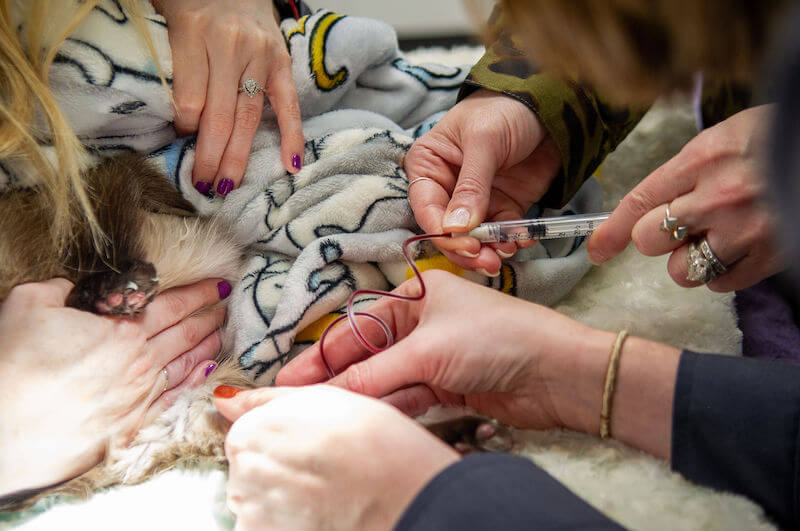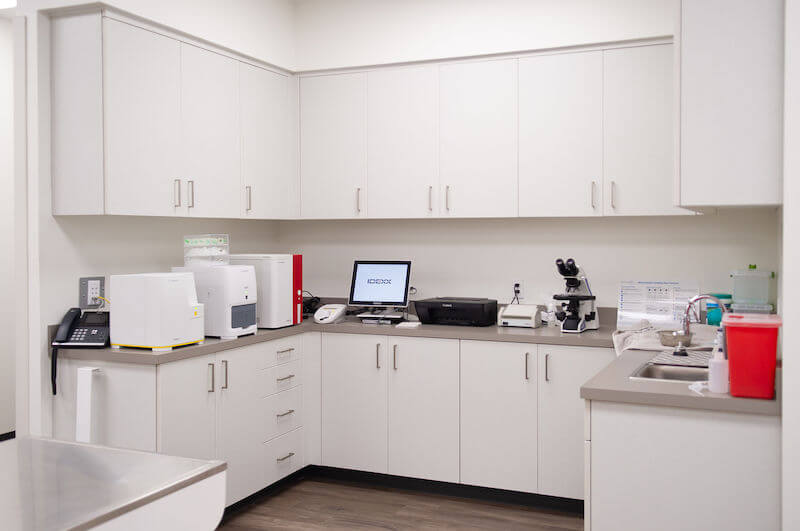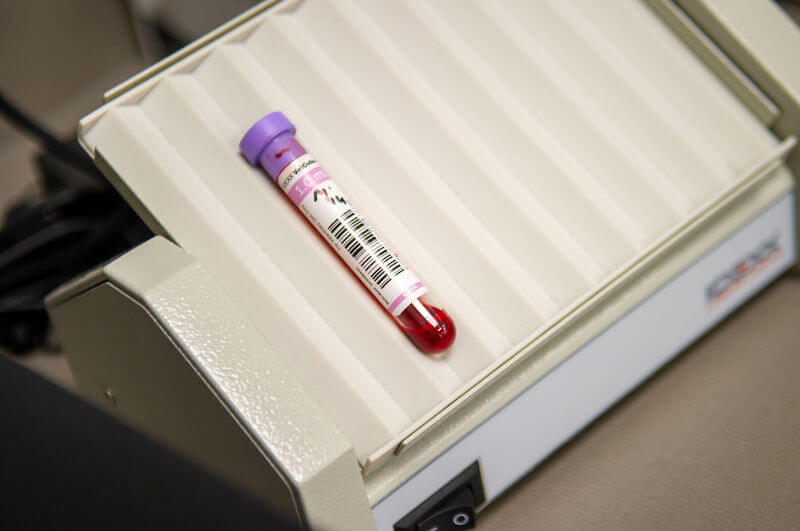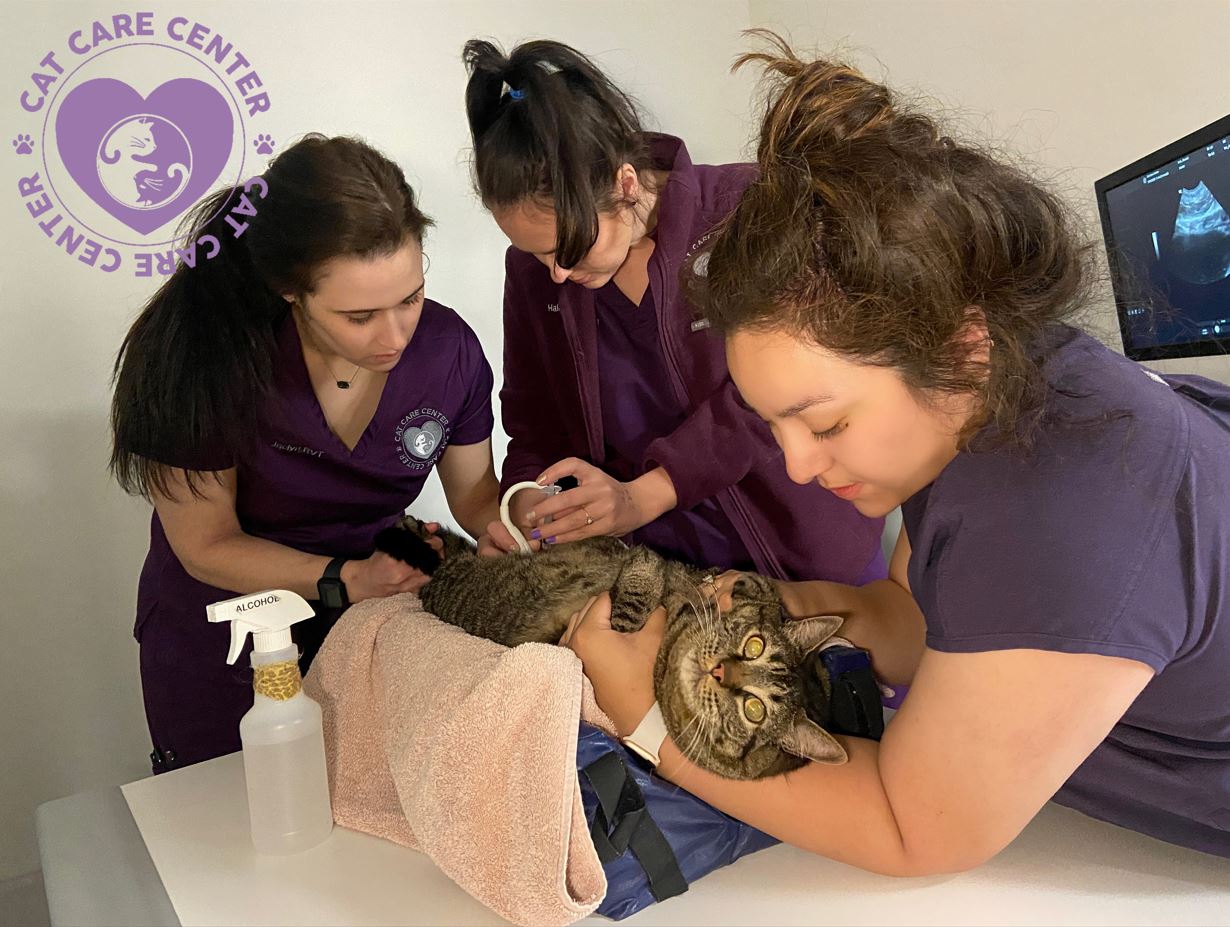When Will a Veterinarian Order Blood Tests for Cats?

Sometimes in the case of an eye or ear infection, your feline friend's medical condition allows the veterinarian to make a relatively straightforward diagnosis. However, other times your cat's presentation results in the need for further examination. In such a case, your veterinarian will order feline blood tests to aid in their investigation. The following situations can result in the need for blood tests for cats:
- On the first veterinary visit: This is recommended to establish healthy baseline values, check for any congenital abnormalities or potential concerns, and help us form an individual wellness plan for your cat.
- During semi-annual and annual wellness exams: Cat blood tests are usually recommended for all life stages from kitten to geriatric cats as part of their periodic wellness exams. These are extremely beneficial in our mature patients, as we often see cats return to a more youthful state of being when blood tests identify an issue that can be easily treated. Cat bloodwork, along with other bodily fluids like urine, can help identify conditions the examination portion of a physical cannot.
- If a cat seems not quite right: Cat blood tests are suitable for cats that are not displaying any overt signs of illness, disease or injury, but are acting abnormal.
- Pre-surgical tests: Cat blood work is used to determine the general health of the liver, kidneys, and other organs, which helps a veterinarian select the safest form of anesthesia. Bloodwork can also help determine the surgical risk level in all cats, especially elderly or injured patients.
Cat blood tests are usually recommended in some manner for all life stages of cats as part of their wellness exams. These are extremely beneficial in establishing a baseline of normal values for an individual cat at a specific stage of life. Dr. Lacie reviews your cat's bloodwork to form an individual preventative wellness plan allowing early detection of trends that may lead to a disease process. We often see our mature, senior, and geriatric cats return to a more youthful state of being when blood tests identify an issue that can be easily treated. Blood tests are performed with feline friendly handling at the forefront and rewards immediately following the procedure. This experience allows your cat to feel as in control as possible and aids in a positive experience for a lifetime of great veterinary care.
At Cat Care Center of Baton Rouge, blood tests for cats are either processed and analyzed on premises at our in-house laboratory, or sent to our reference laboratory. Having an on-site laboratory allows us to quickly and reliably determine and diagnose a health concern and then implement a successful medical intervention based on the results.
Types of Feline Bloodwork

- Feline Leukemia and Feline Immunodeficiency Virus: This is a common test for kittens and cats, especially those with unknown origins. These viruses are interspecies contagious and can be life-threatening, so we recommend feline bloodwork to test for both if you adopt, find, or take in a new kitten or cat, at each life stage, and if they become ill.
- Complete Blood Count (CBC): We analyze cat bloodwork to assess features of the blood, including red and white cell count, immunity status, and the measure of hemoglobin, which is the actual substance in red blood cells that carries oxygen. We also examine hydration status, anemia, infection, blood clotting ability and immune system response. A CBC is essential for cats that have symptoms like fever, vomiting, diarrhea, weakness, pale gums or loss of appetite. A CBC can also detect bleeding disorders or other unseen abnormalities as part of a pre-surgery risk assessment.
- Blood Serum Chemistry: We analyze cat bloodwork to evaluate organ function, electrolyte status, hormone levels and more. These tests are important in evaluating the health of all cats especially as they get older, cats with signs of vomiting, diarrhea or toxin exposure, as well as cats receiving long-term medications and general health before anesthesia.
- Total Thyroid Level: We analyze cat bloodwork for hyperthyroidism, a disease that will have significant effects in a cat's body if not treated.
Additionally, our in-house laboratory can process and analyze:
- Urinalysis
- Stool Samples
- Cytology
What is Feline Leukemia Virus (FeLV)?

This virus is a common infectious disease in cats. It can cause many types of illness in cats including cancer and death. It does not infect humans or other animals. Feline Leukemia Virus (FeLV) can be spread among cats who live together. It is spread from mother to kittens, cats who groom one another, and fighting cats. It is commonly called the disease of friendly cats as it is mainly spread through saliva when cats groom each other, and share food and water bowls. In North America, about 4-5% of cats tested will be positive for this virus. Please see the following link for more information on Feline Leukemia Virus:
What is Feline Immunodeficiency Virus (FIV)?
FIV is a virus infecting cats that can cause many types of illnesses in cats. This virus does not affect humans or other animals. FIV is more commonly found in male cats that are not neutered and fight with other cats. Feline Immunodeficiency Virus is spread through the saliva and is usually passed to other cats through bite wounds. In North America, about 4-5% of at risk cats tested are found to be infected with this virus. Please see the following link for more information on Feline Immunodeficiency Virus:
What Can Be Learned from Feline Blood Tests
The results of feline blood tests are essential to helping veterinarians diagnose and treat medical conditions both within the blood itself, as well as in organs such as the kidney and liver. During a blood test for cats, various chemicals in the blood stream are analyzed. Some examples are:
- Cat blood tests can indicate a deficiency in albumin levels, which indicates a possible liver issue because albumin is produced in the liver, or intestinal or kidney issue as albumin can be lost if these are diseased.
- Blood tests for cats can detect abnormal hormonal-chemical responses to environmental and internal stimuli, which indicates a potential issue with the patient's endocrine system.
Once we establish a correlation, we can order any subsequent feline bloodwork or procedures necessary in diagnosing and treating the condition. In this way, feline blood tests serve as very valuable tools in a veterinarian's toolkit for helping to detect, identify, diagnose, treat and ultimately prevent illness or disease.
Understanding Your Cat's Bloodwork
After we process and analyze a cat bloodwork sample, the next step is to help you fully understand any abnormal results. Your cat's bloodwork allows our veterinarian to evaluate the following:
- Albumin (ALB): This is a serum protein that helps evaluate hydration, hemorrhage, and intestinal, liver, and kidney disease.
- Alkaline phosphatase (ALKP): Elevations in this test may indicate liver disease, gall bladder disease, pancreatic disease, or active bone growth in a young cat. This test is especially significant in cats.
- Alanine aminotansferase (ALT): This test may determine active liver damage, but does not indicate the cause.
- Aspartate aminotransferase (AST): Increases in this test may indicate liver, heart, or skeletal muscle damage.
- Blood urea nitrogen (BUN): This test helps to determines kidney function and intestinal disease. An increased level can be caused by kidney, liver, gastrointestinal, as well as urethral obstruction, shock, or dehydration.
- Calcium (Ca): Changes in the normal level of this test can indicate a variety of diseases. Tumors, hyperparathyroidism, and kidney disease are just a few of the conditions that alter serum calcium.
- Chloride (Cl): Chloride is an electrolyte that is typically lost with symptoms like vomiting. Elevations often indicate dehydration.
- Creatinine (CREA): This test reveals kidney function and helps distinguish between kidney and non-kidney causes of elevated BUN.
- Gamma Glutamyl transferase (GGT): This is an enzyme that indicates liver, gall bladder, and bile duct disease.
- Globulin (GLOB): This is a blood protein that often increases with chronic inflammation and certain diseases.
- Glucose (GLU): Glucose is a blood sugar. Elevated levels may indicate diabetes mellitus. Low levels can cause collapse, seizures, or coma.
- Potassium (K): This is an electrolyte typically lost with symptoms such as vomiting, diarrhea, or excessive urination. Increased levels may indicate kidney failure, dehydration, or urethral obstruction. High levels can lead to cardiac arrest.
- Sodium (Na): Sodium is an electrolyte often lost with symptoms such as vomiting, diarrhea, kidney disease, and others. This test helps indicate hydration status.
- Phosphorus (PHOS): Abnormalities in this test are often associated with kidney disease, hyperthyroidism, and bleeding disorders.
- Total bilirubin (TBIL): Elevations in this test may indicate liver or hemolytic disease. This test helps identify bile duct problems and certain types of anemia.
- Total protein: This test indicates hydration status and provides additional information about the liver, kidneys, and infectious diseases.
- Thyroxine (T4): Thyroxine is a thyroid hormone. High levels indicate hyperthyroidism in cats.
Cat Bloodwork's Role in Diagnosing Disease
Cat bloodwork is an essential component in the diagnosis of disease. Just like any diagnostic tool, blood tests for cats are more effective when used as part of a diagnostic plan which may include other tests. For example, elevated BUN and creatinine levels can indicate a kidney problem. However, they can also indicate mild dehydration in the period leading up to the bloodwork. This is why ordering additional testing is necessary to obtain an accurate diagnosis.

